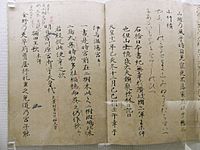Old Japanese facts for kids
Quick facts for kids Old Japanese |
||||
|---|---|---|---|---|
| 上代日本語 | ||||

Manuscript of the Man'yōshū, recording Old Japanese using Chinese characters
|
||||
| Region | Japan | |||
| Era | Evolved into Early Middle Japanese during the Heian period | |||
| Language family |
Japonic
|
|||
| Writing system | man'yōgana | |||
| Linguist List | ojp | |||
|
||||
Old Japanese (上代日本語, Jōdai nihongo) is the earliest known version of the Japanese language. Imagine it as the great-grandparent of the Japanese spoken today! It was used in Japan a very long time ago.
We don't know exactly when Old Japanese started. But we know it ended in the year 794. This was when the Heian period began. Over time, Old Japanese slowly changed into what we call Early Middle Japanese.
Contents
How We Know About Old Japanese
The Japanese writing system came from the Chinese. Early Japanese texts were often written using Chinese characters. These characters were used in a special way to represent Japanese sounds and words.
Ancient Writings and Tablets
Archaeologists have found old wooden tablets with writing on them. These tablets give us clues about how people wrote and spoke back then. The oldest long piece of writing we have is from the year 712. This was at the start of the Nara period (710-794).
Understanding Old Japanese Grammar
The very first texts found in Japan were written mostly in classical Chinese. However, some of these texts show signs of Japanese grammar. For example, the word order might be different from Chinese. This helps us understand how Japanese was structured.
Sometimes, parts of Chinese characters were used to write down the sounds of small Japanese words. These small words are called "particles." By studying these, experts can guess how Old Japanese might have sounded when people spoke it.
How Old Japanese Changed
The Japanese language has changed a lot over hundreds of years. The way people spoke Japanese changed much faster than the way they wrote it. This means that written texts from the past might look different from how people actually talked.
Related pages
Images for kids
See also
 In Spanish: Japonés antiguo para niños
In Spanish: Japonés antiguo para niños
 | Janet Taylor Pickett |
 | Synthia Saint James |
 | Howardena Pindell |
 | Faith Ringgold |

